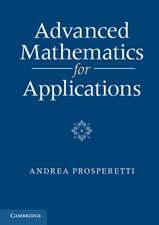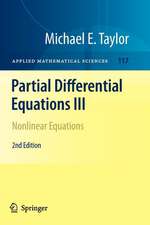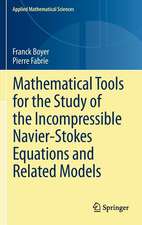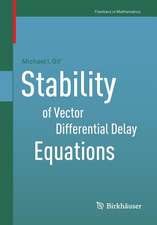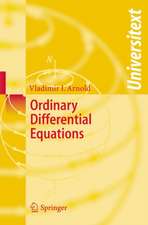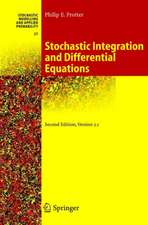Lectures on Partial Differential Equations: Universitext
Autor Vladimir I. Arnold Traducere de Roger Cookeen Limba Engleză Paperback – 29 oct 2003
Like all of Vladimir Arnold's books, this book is full of geometric insight. Arnold illustrates every principle with a figure. This book aims to cover the most basic parts of the subject and confines itself largely to the Cauchy and Neumann problems for the classical linear equations of mathematical physics, especially Laplace's equation and the wave equation, although the heat equation and the Korteweg-de Vries equation are also discussed. Physical intuition is emphasized. A large number of problems are sprinkled throughout the book, and a full set of problems from examinations given in Moscow are included at the end. Some of these problems are quite challenging!
What makes the book unique is Arnold's particular talent at holding a topic up for examination from a new and fresh perspective. He likes to blow away the fog of generality that obscures so much mathematical writing and reveal the essentially simple intuitive ideas underlying the subject. No other mathematical writer does this quite so well as Arnold.
Din seria Universitext
- 13%
 Preț: 353.49 lei
Preț: 353.49 lei -
 Preț: 487.96 lei
Preț: 487.96 lei - 15%
 Preț: 543.75 lei
Preț: 543.75 lei -
 Preț: 418.67 lei
Preț: 418.67 lei - 20%
 Preț: 628.22 lei
Preț: 628.22 lei -
 Preț: 322.62 lei
Preț: 322.62 lei - 17%
 Preț: 364.82 lei
Preț: 364.82 lei -
 Preț: 634.38 lei
Preț: 634.38 lei - 17%
 Preț: 427.32 lei
Preț: 427.32 lei - 13%
 Preț: 355.52 lei
Preț: 355.52 lei - 17%
 Preț: 431.50 lei
Preț: 431.50 lei - 19%
 Preț: 429.21 lei
Preț: 429.21 lei - 19%
 Preț: 393.95 lei
Preț: 393.95 lei -
 Preț: 360.08 lei
Preț: 360.08 lei -
 Preț: 358.44 lei
Preț: 358.44 lei - 13%
 Preț: 389.95 lei
Preț: 389.95 lei -
 Preț: 465.61 lei
Preț: 465.61 lei -
 Preț: 371.99 lei
Preț: 371.99 lei - 15%
 Preț: 497.22 lei
Preț: 497.22 lei - 15%
 Preț: 737.46 lei
Preț: 737.46 lei - 17%
 Preț: 394.41 lei
Preț: 394.41 lei - 15%
 Preț: 509.58 lei
Preț: 509.58 lei - 17%
 Preț: 427.68 lei
Preț: 427.68 lei - 8%
 Preț: 495.44 lei
Preț: 495.44 lei - 17%
 Preț: 364.57 lei
Preț: 364.57 lei - 17%
 Preț: 369.08 lei
Preț: 369.08 lei -
 Preț: 396.55 lei
Preț: 396.55 lei - 15%
 Preț: 553.33 lei
Preț: 553.33 lei - 17%
 Preț: 365.35 lei
Preț: 365.35 lei -
 Preț: 356.78 lei
Preț: 356.78 lei -
 Preț: 673.45 lei
Preț: 673.45 lei - 17%
 Preț: 426.76 lei
Preț: 426.76 lei - 20%
 Preț: 569.56 lei
Preț: 569.56 lei -
 Preț: 372.87 lei
Preț: 372.87 lei -
 Preț: 319.07 lei
Preț: 319.07 lei -
 Preț: 379.86 lei
Preț: 379.86 lei -
 Preț: 445.88 lei
Preț: 445.88 lei -
 Preț: 382.36 lei
Preț: 382.36 lei - 15%
 Preț: 533.72 lei
Preț: 533.72 lei - 15%
 Preț: 496.02 lei
Preț: 496.02 lei - 15%
 Preț: 474.82 lei
Preț: 474.82 lei -
 Preț: 389.70 lei
Preț: 389.70 lei -
 Preț: 484.08 lei
Preț: 484.08 lei - 15%
 Preț: 643.48 lei
Preț: 643.48 lei -
 Preț: 415.02 lei
Preț: 415.02 lei - 15%
 Preț: 602.25 lei
Preț: 602.25 lei - 20%
 Preț: 510.24 lei
Preț: 510.24 lei - 15%
 Preț: 588.37 lei
Preț: 588.37 lei -
 Preț: 381.59 lei
Preț: 381.59 lei
Preț: 481.43 lei
Nou
Puncte Express: 722
Preț estimativ în valută:
92.13€ • 100.04$ • 77.39£
92.13€ • 100.04$ • 77.39£
Carte tipărită la comandă
Livrare economică 22 aprilie-06 mai
Preluare comenzi: 021 569.72.76
Specificații
ISBN-13: 9783540404484
ISBN-10: 3540404481
Pagini: 157
Ilustrații: X, 162 p.
Dimensiuni: 155 x 235 x 14 mm
Greutate: 0.27 kg
Ediția:2004
Editura: Springer Berlin, Heidelberg
Colecția Springer
Seria Universitext
Locul publicării:Berlin, Heidelberg, Germany
ISBN-10: 3540404481
Pagini: 157
Ilustrații: X, 162 p.
Dimensiuni: 155 x 235 x 14 mm
Greutate: 0.27 kg
Ediția:2004
Editura: Springer Berlin, Heidelberg
Colecția Springer
Seria Universitext
Locul publicării:Berlin, Heidelberg, Germany
Public țintă
GraduateCuprins
1. The General Theory for One First-Order Equation.- 2. The General Theory for One First-Order Equation (Continued).- 3. Huygens’ Principle in the Theory of Wave Propagation.- 4. The Vibrating String (d’Alembert’s Method).- 5. The Fourier Method (for the Vibrating String).- 6. The Theory of Oscillations. The Variational Principle.- 7. The Theory of Oscillations. The Variational Principle (Continued).- 8. Properties of Harmonic Functions.- 9. The Fundamental Solution for the Laplacian. Potentials.- 10. The Double-Layer Potential.- 11. Spherical Functions. Maxwell’s Theorem. The Removable Singularities Theorem.- 12. Boundary-Value Problems for Laplace’s Equation. Theory of Linear Equations and Systems.- A. The Topological Content of Maxwell’s Theorem on the Multifield Representation of Spherical Functions.- A.1. The Basic Spaces and Groups.- A.2. Some Theorems of Real Algebraic Geometry.- A.3. From Algebraic Geometry to Spherical Functions.- A.4. Explicit Formulas.- A.6. The History of Maxwell’s Theorem.- Literature.- B. Problems.- B.1. Material from the Seminars.- B.2. Written Examination Problems.
Recenzii
From the reviews of the German edition:
"This book provides an introductory text (in German) to basic partial differential equations, based on the author's lectures at Moscow University. […] Most of the standard themes are treated (see list below), but some unusual topics are covered as well. For instance, in chapter 10 double layer potentials are considered, and chapters 11 and 13 deal (among others) with Maxwell's theorem on the multipole expansion of spherical functions. The style of the book is quite non-technical (it contains almost no estimates), taking a mainly geometric viewpoint. [...]"
Markus Kunze, Zentralblatt für Mathematik 1076.35001
From the reviews:
"[...] This excellent and stimulating textbook gives a beautiful first view on some basic aspects of the theory of partial differential equations and can be warmly recommended to any graduate student in mathematics and physics."
M.Günther, Zeitschrift für Angewandte Analysis und Ihre Anwendungen, Vol. 24, Issue 4, 2005
"…..Arnold .. has long held a reputation as one of the world's leaders in dynamics and geometry. His Lectures survey big ideas; accordingly, he largely suppresses both the functional analytic formalism and the delicate estimates so characteristic of the subject. He takes the viewpoint that the most important PDEs arise in physics and the most important mathematical ideas contributing to their solution derive from physical principles.
Amold concentrates on the simplest equations of a given type and shows how the key ideas play out. For example, he attacks the general theory of one first-order equation, first via wave-particle duality, then via Hamiltonian dynamics. .... The author's stature and the book's lucidity make this an essential acquisition for all College libraries. …."
D.V.Feldman, CHOICE, January 2005 Vol. 42 No. 05
"... Professor Arnold's Lectures on Partial Differential Equations is anambitious, intensely personal effort to reconnect the subject with some of its roots in modeling physical processes. He does so in a lively lecture-style format, resulting in a book that would complement almost any course in PDEs. ...
As can be gleaned from the previous paragraph, we bouth found the book by V.I.Arnold most stimulating and thought provoking, leading to statements such as, "It has been years since I enjoyed a book so much" by RBG and "I cannot point to any other book in mathematics written with the same intensity" by EAT. ...
... what follows [...] is a beautiful book on PDEs, interwoven with the exposition of deep physical, geometrical, and topological insights that contribute to both the understanding and history of PDEs.
Prof. Arnold's book ... connects with the roots of the field and brings in concepts from geometry, continuum mechanics, and analysis. It can be used together with any book on PDEs and students will welcome its directness and freshness. We know of no other book like it on the market and highly recommend it for individual reading and as an accompaniment to any course in PDEs. ..."
R.B. Guenther, E.A.Thomann, SIAM Review, Vol. 47, No. 1, 2005
"This book contains the transcripts of twelve lectures on partial differential equations … . The presentation gives a vivid sense of what was actually said and discussed in the lecture course, and in this fashion the book differs markedly from many text books with similar titles. … The author uses physical intuition to derive the various mathematical theories, and is thus able to explain the ideas … in a fashion which is clear and helpful to both novice and expert."
M. Groves, ZAMM-Zeitschrift für Angewandte Mathematik und Mechanik, Vol. 85 (4), 2005
"[...] In brief, this book contains beautifully structured lectures on classical theory of linear partial differential equations of mathematical physics. Professor Arnold stresses theimportance of physical intuitions and offers in his lecture a deep geometric insight into these equations. The book is highly recommended to anybody interested in partial differential equations as well as those involved in lecturing on these topics. I encourage readers of this book to take note of the Preface which contains very interesting comments on the role of Bourbaki's group in mathematics, a theme which resurfaces many times in these lectures."
J.Chabrowski, Gazette, Australian Mathematical Society, Vol. 31, Issue 5, 2004
"... As a result the author has aimed to impart to students with pre-knowledge of only a basic kind (linear algebra, basic analysis, ordinary differential equations, ...) the essence of the theory and applications of the subject of partial differential equations.
Of course the subject is fundamental in mathematics and in physics and the author is an evangelist for keeping the subject mainstream for mathematicians and for physicists. He has attempted, he writes, to adhere to the principle of minimal generality, according to which every idea should first be clearly understood in the simplest situation! This is successfully done, so that this book should prove attractive in length and in scope to its target readership. ...
In this new excellent text are included a large number of interesting problems; at the end of the book there is a full set of problems from examinations given in Moscow. ..."
F.H.Berkshire, Imperial College London, Contemporary Physics 2004, Vol. 45, Issue 6
"Like all Vladimir Arnold’s books, this one is full of geometric insight. Arnold illustrates every principle with a figure. This book aims to cover the most basic parts of the subject … . A large number of problems are sprinkled throughout the book, and a full set of problems from examinations given in Moscow are included at the end. Some of these problems are quite challenging!"
L’EnseignementMathematique, Vol. 50 (1-2), 2004
"Dieses Buch betont geometrische Einsicht und physikalische Intuition. Die Prinzipien werden an Bildern erläutert, und das Buch enthält mehr Text als Formeln und Sätze. […]. Neben einer großen Anzahl von Übungsaufgaben, die im Buch verstreut sind, finden sich interessante Prüfungsbeispiele der Moskauer Universität."
J. Hertling, Internationale Mathematische Nachrichten, 2004, Issue 197, p. 47-48
"The book is based on a short course of lectures delivered to the third year mathematics students of the Independent University of Moscow … . The book can serve as a nonstandard, geometrically motivated introduction to PDEs for students … . It is, probably, worth mentioning that the introduction contains some general philosophical views of the author on the subject of PDEs and modern mathematics as a whole and will be of interest to a broad mathematical audience." (Victor Shubov, MathDL, January, 2001)
"Like other books of Arnold, this is a very original introduction to the subject. It is … based on a course delivered to third-year students of mathematics. The aim of this book is to teach the fundamental ideas of partial differential equations and mathematical physics. … Not only students but also professional mathematicians from other fields of mathematics can learn the basic and simple ideas of partial differential equations from this unique book." (Tibor Krisztin, Acta Scientiarum Mathematicarum, Vol. 74, 2008)
"This book provides an introductory text (in German) to basic partial differential equations, based on the author's lectures at Moscow University. […] Most of the standard themes are treated (see list below), but some unusual topics are covered as well. For instance, in chapter 10 double layer potentials are considered, and chapters 11 and 13 deal (among others) with Maxwell's theorem on the multipole expansion of spherical functions. The style of the book is quite non-technical (it contains almost no estimates), taking a mainly geometric viewpoint. [...]"
Markus Kunze, Zentralblatt für Mathematik 1076.35001
From the reviews:
"[...] This excellent and stimulating textbook gives a beautiful first view on some basic aspects of the theory of partial differential equations and can be warmly recommended to any graduate student in mathematics and physics."
M.Günther, Zeitschrift für Angewandte Analysis und Ihre Anwendungen, Vol. 24, Issue 4, 2005
"…..Arnold .. has long held a reputation as one of the world's leaders in dynamics and geometry. His Lectures survey big ideas; accordingly, he largely suppresses both the functional analytic formalism and the delicate estimates so characteristic of the subject. He takes the viewpoint that the most important PDEs arise in physics and the most important mathematical ideas contributing to their solution derive from physical principles.
Amold concentrates on the simplest equations of a given type and shows how the key ideas play out. For example, he attacks the general theory of one first-order equation, first via wave-particle duality, then via Hamiltonian dynamics. .... The author's stature and the book's lucidity make this an essential acquisition for all College libraries. …."
D.V.Feldman, CHOICE, January 2005 Vol. 42 No. 05
"... Professor Arnold's Lectures on Partial Differential Equations is anambitious, intensely personal effort to reconnect the subject with some of its roots in modeling physical processes. He does so in a lively lecture-style format, resulting in a book that would complement almost any course in PDEs. ...
As can be gleaned from the previous paragraph, we bouth found the book by V.I.Arnold most stimulating and thought provoking, leading to statements such as, "It has been years since I enjoyed a book so much" by RBG and "I cannot point to any other book in mathematics written with the same intensity" by EAT. ...
... what follows [...] is a beautiful book on PDEs, interwoven with the exposition of deep physical, geometrical, and topological insights that contribute to both the understanding and history of PDEs.
Prof. Arnold's book ... connects with the roots of the field and brings in concepts from geometry, continuum mechanics, and analysis. It can be used together with any book on PDEs and students will welcome its directness and freshness. We know of no other book like it on the market and highly recommend it for individual reading and as an accompaniment to any course in PDEs. ..."
R.B. Guenther, E.A.Thomann, SIAM Review, Vol. 47, No. 1, 2005
"This book contains the transcripts of twelve lectures on partial differential equations … . The presentation gives a vivid sense of what was actually said and discussed in the lecture course, and in this fashion the book differs markedly from many text books with similar titles. … The author uses physical intuition to derive the various mathematical theories, and is thus able to explain the ideas … in a fashion which is clear and helpful to both novice and expert."
M. Groves, ZAMM-Zeitschrift für Angewandte Mathematik und Mechanik, Vol. 85 (4), 2005
"[...] In brief, this book contains beautifully structured lectures on classical theory of linear partial differential equations of mathematical physics. Professor Arnold stresses theimportance of physical intuitions and offers in his lecture a deep geometric insight into these equations. The book is highly recommended to anybody interested in partial differential equations as well as those involved in lecturing on these topics. I encourage readers of this book to take note of the Preface which contains very interesting comments on the role of Bourbaki's group in mathematics, a theme which resurfaces many times in these lectures."
J.Chabrowski, Gazette, Australian Mathematical Society, Vol. 31, Issue 5, 2004
"... As a result the author has aimed to impart to students with pre-knowledge of only a basic kind (linear algebra, basic analysis, ordinary differential equations, ...) the essence of the theory and applications of the subject of partial differential equations.
Of course the subject is fundamental in mathematics and in physics and the author is an evangelist for keeping the subject mainstream for mathematicians and for physicists. He has attempted, he writes, to adhere to the principle of minimal generality, according to which every idea should first be clearly understood in the simplest situation! This is successfully done, so that this book should prove attractive in length and in scope to its target readership. ...
In this new excellent text are included a large number of interesting problems; at the end of the book there is a full set of problems from examinations given in Moscow. ..."
F.H.Berkshire, Imperial College London, Contemporary Physics 2004, Vol. 45, Issue 6
"Like all Vladimir Arnold’s books, this one is full of geometric insight. Arnold illustrates every principle with a figure. This book aims to cover the most basic parts of the subject … . A large number of problems are sprinkled throughout the book, and a full set of problems from examinations given in Moscow are included at the end. Some of these problems are quite challenging!"
L’EnseignementMathematique, Vol. 50 (1-2), 2004
"Dieses Buch betont geometrische Einsicht und physikalische Intuition. Die Prinzipien werden an Bildern erläutert, und das Buch enthält mehr Text als Formeln und Sätze. […]. Neben einer großen Anzahl von Übungsaufgaben, die im Buch verstreut sind, finden sich interessante Prüfungsbeispiele der Moskauer Universität."
J. Hertling, Internationale Mathematische Nachrichten, 2004, Issue 197, p. 47-48
"The book is based on a short course of lectures delivered to the third year mathematics students of the Independent University of Moscow … . The book can serve as a nonstandard, geometrically motivated introduction to PDEs for students … . It is, probably, worth mentioning that the introduction contains some general philosophical views of the author on the subject of PDEs and modern mathematics as a whole and will be of interest to a broad mathematical audience." (Victor Shubov, MathDL, January, 2001)
"Like other books of Arnold, this is a very original introduction to the subject. It is … based on a course delivered to third-year students of mathematics. The aim of this book is to teach the fundamental ideas of partial differential equations and mathematical physics. … Not only students but also professional mathematicians from other fields of mathematics can learn the basic and simple ideas of partial differential equations from this unique book." (Tibor Krisztin, Acta Scientiarum Mathematicarum, Vol. 74, 2008)
Caracteristici
A top textbook written by one of the most famous living mathematicians Includes supplementary material: sn.pub/extras



